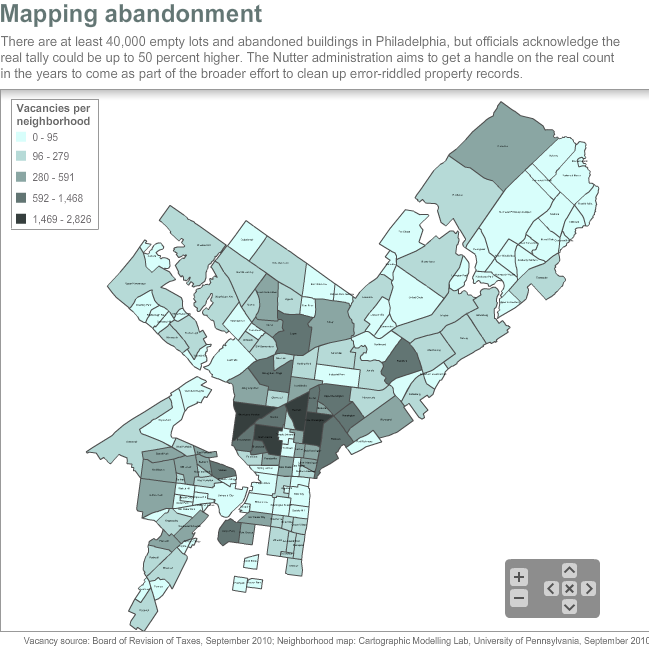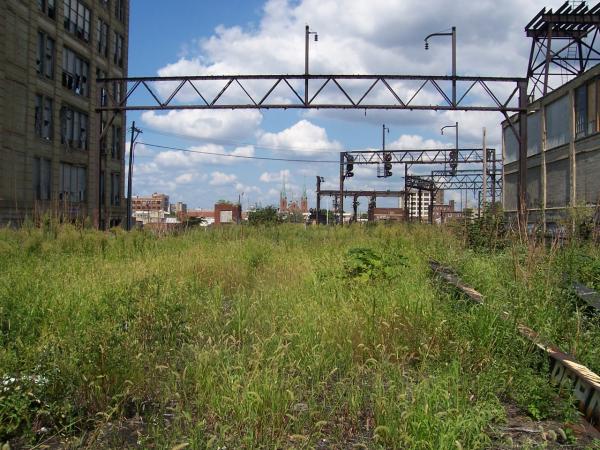Philadelphia’s imminent vacant land plan: major progress, or major letdown?
The City of Philadelphia has all but finished an overhaul of its land disposition policy, a long awaited move designed to put more of the city’s nearly 13,000 vacant properties – virtually all of them vacant and many of them blighted – back into productive use.
According to a draft copy of the plan obtained by PlanPhilly, the new policy does not radically differ from prior practice, so much as it clarifies and codifies what critics have said is an opaque and complicated process, while creating a single point of contact – or “Front Door” – for would-be developers of city land.
Instead of three separate, conflicting policies, administered unevenly by three distinct city land-holding agencies, there will soon be a single set of rules governing the sale of city-owned land to for-profit developers, community organizations and individuals.
The 12-page policy formally provides for unlimited discounted pricing of properties for preferred buyers, provided the transaction “provides significant community benefits,” a determination that is purely at the city’s discretion. Terms of discounted sales, though, would “be made available for public review via the website.”
Critics of the pending policy have two major complaints. The first is that the plan does not go far enough, given the enormity of the city’s problems with vacant land. More was expected, they say, after more than a year and a half of work. Others are concerned that the plan formally concentrates power in the hands of politicians and their favored organizations, putting private market builders in a secondary position.
For instance, as drafted, the policy cements the veto-power of district council members, noting that “applicants must have a letter of support from their district council member.” The clause effectively eliminates those buyers whose proposals, personalities or political affiliations have displeased their district council member.
PlanPhilly’s version of the draft document, which was first reported on by City Paper, is dated Dec. 6, 2011. But there have been few substantive changes to the policy since then, city officials confirmed, and the alterations that have been made mostly involve urban gardening provisions.
Although the work is largely complete, the city does not plan to formally roll out the new policy until late March or April, said Brian Abernathy, chief of staff to city Managing Director Richard Negrin, whose office has coordinated the city’s new policy.
One of the most intriguing elements of the initiative goes unmentioned in the draft plan. The Redevelopment Authority is now soliciting bids for a new website and “brand,” which would serve as the virtual Front Door for the city’s property holdings (the city is hoping for a site similar to that of the New Orleans Redevelopment Authority).
The new site – slated to launch to this summer, according to the RFP – would include a mappable database of all properties available for purchase through the Redevelopment Authority’s Front Door. If built to specifications, would-be buyers could perform searches for available properties based on different criteria, and begin the application to purchase property online. Such functionality would easily trump the limited, broken-link-ridden current consolidated listing, which was announced with fanfare last year.
A Modest Proposal
And yet, even with those features, the city’s draft policy falls well short of any kind of comprehensive plan for dealing with the estimated 40,000 pieces of vacant property that spread blight, depress property values and attract crime in neighborhoods across the city.
For one, the plan does not address privately-held abandoned properties, which comprise a large majority of vacant parcels. Nor does it even apply to all properties owned by city-related agencies. Properties owned by the Philadelphia Housing Authority or the Philadelphia Industrial Development Corporation are not covered by this policy, meaning that buyers interested in their parcels would get no help from the RDA’s Front Door.
And while a Front Door may make business easier for some would-be-buyers, the plan does nothing to cut down on the administrative overhead or redundancies associated with a city that has no fewer than five agencies that are major land–owners.
The draft plan is a far cry from the unified land bank proposed last month by City Council members Maria Quiñones-Sánchez and Bill Green. That proposed ordinance, and state legislation sponsored by Rep. John Taylor (R., Philadelphia), would enable the city to create a new entity, which would consolidate most city holdings (again, PHA and PIDC are not covered) under the ownership of the land bank.
The Nutter administration’s draft policy makes no mention of land acquisition. It deals entirely with the sale of city-owned lands. In comparison, both the proposed local and state land bank bills (neither of which has yet been passed) empower the city to acquire tax delinquent properties and add them to the city’s inventory without exposing those parcels to sheriff sale.
Indeed, the administration’s draft policy makes no mention of what the city ought to do reduce the huge backlog of tax delinquent properties in Philadelphia, which has more property tax deadbeats than any big city in the nation.
Abernathy characterized the new policy as the beginning of the administration’s approach to managing vacant land, not the end. He said the administration remains open to the idea of a land bank, and called the consolidation of the myriad city land agencies a “a great goal.”
“The complexities around consolidation are significant. This is a first step, it’s not the final step,” Abernathy said.
For instance, the city hopes to eventually include the Philadelphia Housing Authority in its Front Door, Abernathy said. The agency was going through some “significant turmoil” when the policy was being drafted, he said, but the city hopes that future sales of PHA holdings will some day be governed by the draft plan.
Likewise, Abernathy said, “tax delinquency is an issue that everybody wants to tackle.” First, though, the city wanted a clear plan on how to deal with the land it already owns.
“We recognize we own a significant amount of property, and we need to get that property back to the market,” he said. “Making sure we’re not the largest slum landlord in the city was important to us.”
Abernathy also defended the plan’s protection of district council members veto power – also known as council-manic prerogative – over redevelopment projects in the neighborhoods they represent. “To ignore them is an insult,” he said. “Prerogative has a purpose.”
Getting even this far was a challenge, Abernathy said, given the many agencies, missions and history involved.
And Abernathy considers the plan a significant step forward, particularly the Front Door. Would-be buyers, he said, would work with the RDA regardless of which agency actually owned the property, giving them a single point of contact. “It’s sort of like a caseworker, but for property.”
Reaction Mixed
The proposed Front Door is “a vast improvement over where the system has been,” said Rick Sauer, executive director of the Philadelphia Association of Community Development Corporations.
But Sauer doesn’t think the policy goes far enough. “It’s not sufficient in itself. In the long run we should be consolidating ownership of this land under a unified Philadelphia land bank.”
PACDC was one of a number of organizations that gave the city extensive feedback on its proposed policy. Sauer said he had yet to hear back on what the city made of many of the recommendations.
Councilman Green was underwhelmed by the plan, and said it did not go far enough to address the city’s vacant land problems.
“Let’s just put it all there, everything, and see what offers we get,” said Green. “We’ve been saying that since 2008.”
Green is worried that the draft plan puts too many restraints on would-be buyers of the city’s property. And he said that it would be better to combine the land-holding entities into a single land bank, rather than try to coordinate across agencies behind a Front Door.
Point Breeze developer Ori Feibush, a prolific and oft-frustrated purchaser of city and tax delinquent properties, blasted the draft plan as a massive mistake. He said it formalized and codified the city’s preference for giving land at reduced rates to politically-favored non-profits, instead of selling it to the highest bidder.
“They’re changing nothing here other than putting out a pretty list of who’s holding what lots,” said Feibush, president of OCF Realty, which owns the real-estate and development blog Naked Philly. It’s worse than nothing, actually, because they’re creating a legal framework for stifling market rate development.”
A policy provision requiring that buyers commit to building in a “appropriate and timely manner” and meet other conditions will make it more difficult for market-rate builders to develop abandoned city lots, Feibush said.
“The city needs to get out of the business of owning real estate. They should auction off every single property tomorrow to the highest bidder,” Feibush said. “The ones that don’t sell, those are they ones the city should be talking to community organizations about.”
Other Elements of the Draft Policy
- All buyers must meet be qualified before acquiring city land. They cannot own other properties that are violating city code, that are tax delinquent, or that were confiscated by the District Attorney due to criminal activity.
- Buyers would have to show their development plans and demonstrate they have the financial capacity to perform the work.
- Development would have to “give consideration” to city and neighborhood plans, such as Phila2035 and Greenworks.
- Properties could be sold directly (at the request of a purchaser who meets the city’s listed price), through broker listings, or at discount for uses such as “affordable housing, economic development, community development, or side yards.”
- The draft policy includes provisions for individually and community-owned urban gardens, but those portions of the plan have been rewords since the December draft plan.
Contact the reporter at patrick@patrickkerkstra.com
WHYY is your source for fact-based, in-depth journalism and information. As a nonprofit organization, we rely on financial support from readers like you. Please give today.






